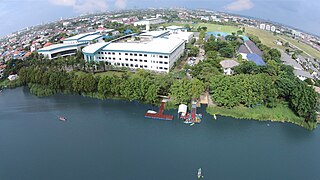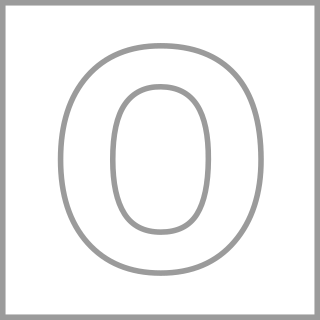The General Certificate of Secondary Education (GCSE) is an academic qualification in a range of subjects taken in England, Wales, and Northern Ireland, having been introduced in September 1986 and its first exams taken in 1988. Public schools in Scotland use the Scottish Qualifications Certificate instead. However, private schools in Scotland often choose to follow the English GCSE system.
Education in the United Kingdom is a devolved matter, with each of the countries of the United Kingdom having separate systems under separate governments. The UK Government is responsible for England, whilst the Scottish Government, the Welsh Government and the Northern Ireland Executive are responsible for Scotland, Wales and Northern Ireland, respectively.
Education in Malaysia is overseen by the Ministry of Education. Although education is the responsibility of the Federal Government, each state and federal territory has an Education Department to co-ordinate educational matters in its territory. The main legislation governing education is the Education Act 1996.
Higher education in Mauritius includes colleges, universities and other technical institutions. Public university education has been free to students since 2019. The sector is managed by the Higher Education Commission (HEC) which has the responsibility for allocating public funds, and fostering, planning and coordinating the development of post-secondary education and training. Formerly the Tertiary Education Commission, in 2020 it was reformed into the HEC and a separate Quality Assurance Authority (QAA) for auditing of qualifications.
Cambridge International Education is a provider of international qualifications, offering examinations and qualifications to 10,000 schools in more than 160 countries. It is part of Cambridge University Press & Assessment, a non-profit and non-teaching department of the University of Cambridge.

The International General Certificate of Secondary Education (IGCSE) is an English language based secondary qualification similar to the GCSE and is recognised in the United Kingdom as being equivalent to the GCSE for the purposes of recognising prior attainment. It was developed by Cambridge Assessment International Education. The examination boards Edexcel, Learning Resource Network (LRN), and Oxford AQA also offer their own versions of International GCSEs. Students normally begin studying the syllabus at the beginning of Year 10 and take the test at the end of Year 11. However, in some international schools, students can begin studying the syllabus at the beginning of Year 9 and take the test at the end of Year 10.
The Certificate of Secondary Education (CSE) was a subject-specific qualification family awarded in both academic and vocational fields in England, Wales and Northern Ireland. CSE examinations were held in the years 1965 to 1987. This qualification should not be confused with the Indian Certificate of Secondary Education which is a school-leaving qualification in India. Also, in some African and former British colonial countries there is a qualification named the Certificate of Secondary Education based on the original and former British variant. Also, the CSE should not be confused with the African qualification CSEE.

International schools are private schools that promote education in an international environment or framework. Although there is no uniform definition or criteria, international schools are usually characterised by a multinational student body and staff, multilingual instruction, curricula oriented towards global perspectives and subjects, and the promotion of concepts such as world citizenship, pluralism, and intercultural understanding; most are private schools. Many international schools adopt a curriculum from programmes and organisations such as the International Baccalaureate, Edexcel, Cambridge International Education, FOBISIA, International Primary Curriculum, or Advanced Placement. International schools often follow a curriculum different from the host country, catering mainly to foreign students, such as members of expatriate communities, international businesses or organisations, diplomatic missions, or missionary programmes. Admission is sometimes open to local students to provide qualifications for employment or higher education in a foreign country, offer high-level language instruction, and/or foster cultural and global awareness.
The Academia Británica Cuscatleca (ABC) is an established and highly regarded international bilingual school in El Salvador. It is a community of some 1400 students and is fully accredited by Council of International Schools (CIS), the International Baccalaureate Organisation (IBO), the International Primary Curriculum (IPC) and the Values-Based Trust for Education (VBFT).

Education in Mauritius is managed by the Ministry of Education & Human Resources, which controls the development and administration of state schools funded by government, but also has an advisory and supervisory role in respect of private schools. The Tertiary education is maintained by the Ministry of Tertiary Education, Science, Research and Technology. The government of Mauritius provides free education to its citizens from pre-primary to tertiary levels. Since July 2005, the government also introduced free transport for all students. Schooling is compulsory up to the age of 16. Mauritian students consistently rank top in the world each year for the Cambridge International O Level, International A and AS level examinations. Among sub-Saharan African countries, Mauritius has one of the highest literacy rates. The adult literacy rate was at 91.9% in 2022. According to the 2022 census, the proportion of people with higher education has increased to 8.8%. Mauritius was ranked 57th in the Global Innovation Index in 2023, 1st in Africa.

Garden International School (GIS) is a private, co-educational international school in Mont Kiara, Segambut, Kuala Lumpur, Malaysia. Founded in 1951, GIS is one of the oldest and most prestigious private schools in Malaysia. GIS is part of the Taylor's Education Group and a member of the Federation of British International Schools in Asia (FOBISIA).

The A-level is a subject-based qualification conferred as part of the General Certificate of Education, as well as a school leaving qualification offered by the educational bodies in the United Kingdom and the educational authorities of British Crown dependencies to students completing secondary or pre-university education. They were introduced in England and Wales in 1951 to replace the Higher School Certificate. The A-level permits students to have potential access to a chosen university they applied to with UCAS points. They could be accepted into it should they meet the requirements of the university.

The O-Level is a subject-based qualification conferred as part of the General Certificate of Education. It began in the United Kingdom and has been adopted, often with modifications, in several other countries.
The A-level is a main school leaving qualification of the General Certificate of Education in England, Wales, Northern Ireland, the Channel Islands and the Isle of Man. It is available as an alternative qualification in other countries, where it is similarly known as an A-Level.

The Cambridge School is a private international school that is located in Doha, Qatar, the school provides an education based on the National Curriculum for England to students from Kindergarten to Year 13. The school prepares students for the IGCSE, AS and A Level, following the Cambridge International Examinations Board. The school has grown from just under 300 students seven years ago to almost over 1,500 students with over 60 different nationalities. Some of the teachers are from the United Kingdom, although most of them are from South Africa and India. The school is founded by Mohammed Taleb Mohammed Al Khouri and managed by the Taleb Group. The company also own and manage two other schools in Qatar, Cambridge International School for Girls and Doha Modern Indian School.
Rome International School (RIS) is a private international school in Rome, Italy. The school offers international education to children aged 2 to 18 years from Nursery through to Grade 13. The language of instruction is English. RIS is an International Baccalaureate School offering the IB Primary Years Programme in the Elementary School and the IB Diploma Programme in the last two years of High School. Students in Grades 10 and 11 sit the Cambridge IGCSE.
A high school diploma is a diploma awarded upon graduation of high school. A high school diploma is awarded after completion of courses of studies lasting four years, from grade 9 to grade 12. It is the school leaving qualification in the United States and Canada.

Bishkek International School is an international school in Bishkek founded by a group of international and local parents as a non-profit community school and legally registered as a non-profit foundation in the Kyrgyz Republic on December 1, 2010.
MET Rishikul Vidyalaya is a private co-educational registered International Cambridge day school in Mumbai, Maharashtra, India, established in 2002.







